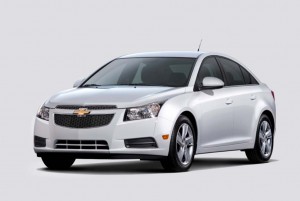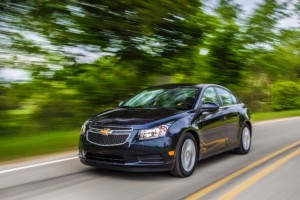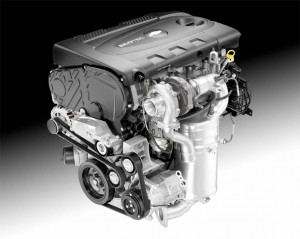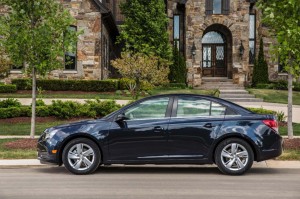It looks like your run-of-the-mill Chevrolet Cruze, albeit with a nicely loaded interior. But it only takes a second, after you slip behind the wheel and turn the key, to recognize something’s different.
There’s that chattering sound from under the hood that tells you this is the new 2014 Chevrolet Cruze Turbo Diesel, the first time any of General Motors’ U.S. brands has put an “oil burner” under the hood of a passenger car since 1986. There’s good reason why it’s taken so long considering the disastrous diesels it produced in the mid-‘80s, models so bad they almost single-handedly destroyed the American diesel market.
But it’s a new world. Technologies such as high-pressure injection and turbocharging have transformed the modern diesel, making them smooth, quiet, quick and clean. Or, at least, that’s what we’ve experienced from other manufacturers, such as Volkswagen, Audi, BMW and Mercedes-Benz. So TheDetroitBureau.com went to Hell and back – Hell, Michigan, that is, to see if the new Cruze Turbo Diesel was anywhere near as good as the competition.
Slipping the 6-speed automatic into gear, we pulled out of the Hell Creek Ranch and went for a long drive through Southeast Michigan to get a feel for Chevy’s new diesel. To our pleasure, the initial clatter that has been a diesel trademark quickly quieted down as we accelerated – quickly – onto a rain-spattered roadway. Indeed, even at idle the turbocharged engine was all but silent once it warmed up.
With a highway mileage of 46 mpg – which GM proudly notes is the highest of “any non-hybrid vehicle sold in America” – the 2014 Chevrolet Cruze Turbo Diesel should have an instant appeal to anyone looking to reduce their fuel consumption. That is, in fact, pushing up into hybrid territory and about 4 mpg better than both the gasoline-powered Chevy Cruze ECO and the Volkswagen Jetta TDI, the new Cruze Diesel’s most direct competitor.
(After nearly killing the diesel, GM wants to bring it back. Click Here for more.)
The new Chevy oil burner is also quick for such a high-mileage offering, turning 0 to 60 times of around 8.6 seconds. Depending upon whose numbers you trust, that’s a bit better than the Jetta TDI – and a good second-and-a-half off the launch times of both the vaunted Toyota Prius and the Cruze Eco.
The turbocharged Cruze also shows little to no lag at launch, a big plus compared to some boosted models. Indeed, it has a sporty feel that might surprise those not familiar with the Cruze in general. Dare we say that the overall road feel compares unexpectedly well with the VW Jetta TDI.
Of course, it helps to have an extra 11 horsepower and 28 pound-feet of torque, the 2014 Cruze Turbo Diesel’s 2.0-liter inline-four coming in at 151 hp and 264 lb-ft. That’s also a substantial bump up from the Cruze Eco – though the diesel version does have to carry about 200 pounds more mass, most of that in the form of the engine itself and the requisite emissions systems bringing NOx and particulates in line with federal and even tougher California mandates.
(VW takes service action to keep gas out of diesel fuel tanks. Click Here for the story.)
The Cruze Diesel also carries a stiff price premium, at $25,695, it’s about $4,000 more than the 42 mpg gas-powered Cruze Eco – though $630 less than the VW Jetta TDI. You do get a more lavish interior and some additional standard equipment. Among the base features are the OnStar safety and security system, leather-trimmed 6-way power seats, 10 airbags – and a five-star crash rating.

Chevy officials say they may offer some additional diesel passenger cars if the Cruze Turbo Diesel sells well.
There’s also a large LCD screen topping the center stack can be upgraded for navigation – including a feature to help you find the nearest service station pumping diesel. That’s less of a problem than just a couple years ago, the advocacy group The Diesel Technology Forum reporting that 52% of American service stations now offer the fuel. And that figure is likely to grow as sales of diesel vehicles increases.
So, is it worth paying the added price and suffering the occasionally longer drive to find a pump? If you want something that’s both extremely fuel-efficient and sporty at the same time, than a diesel should prove more appealing than a hybrid or one of the many new “eco” models that usually aren’t much better than stone ponies.
(Diesel to soon outsell gasoline worldwide, forecasts ExxonMobil. Click Here for more.)
But there are some things to consider before you sign the contract. Hybrids generally have their biggest mileage advantage around town. Diesels, on the other hand, do best on the highway. If you’re going to do a large portion of your driving in stop-and-go traffic an oil burner like the 2014 Chevrolet Cruze Turbo Diesel may not be the best choice. It’s EPA City rating slips to a still-good 27 mpg, one mile a gallon less than the Cruze ECO – and a lot less than what the typical hybrid will get you.
And you also need to think about fuel prices. Over the past year, we have seen diesel run anywhere from 20 cents to almost $1 over regular unleaded. Lately, the gap has been narrowing, however. Nonetheless, it’s a good idea to do the numbers – adding in whatever value you perceive for the added performance which, for some motorists, is worth a lot.
The 2014 Chevrolet Cruze Diesel is a far away as one can imagine from the horrific GM diesels of the ‘80s. It’s well-mannered on the road, peppy, smooth and clean. And its incredible mileage – and 717 mile range on a single tank – are hard to ignore. If the math adds up, the new sedan definitely should be on your radar.




It’s good to see GM get their act together and offer a quality Diesel pass car engine. They used the proper target with the VW Diesel Jetta. I expect their slightly better mpg is from using a fuel/emission system specifically designed to address the absurd U.S. Diesel emission specs which are the most stringent in the world – and unreasonable by design to discourage the use of clean Diesels and steer consumers toward impractical EVs and lesser value hybrids.
It’s worth noting that the VW Diesels actually gets significantly better mpg in use than the EPA rating. VW challenged the EPA on their mpg measurement procedure because it is not representative of what customers actually see – by design. It would be interesting to see if GM’s Diesel meets or exceeds the EPA rating.
There is absolutely no reason for Diesel fuel to cost even close to gasoline but with an industry monopoly, the oil industry Cabal can charge whatever they desire for gas and Diesel fuel – and they do as they are completely unregulated.
One of the big advantages to Diesels compared to gas engines that many people overlook is reduced maintenance costs. Good modern pass car and HD truck Diesels last at least twice as long as a gas engine and require far lower maintenance than gas engines.
Good comments, but I’d make one correction – and I’ve been driving diesel Mercedes (1983 – 2011) and VW (2011 – 2013)for a LONG time, albeit all straight shift. Because diesels idle dead lean, and gasoline engines idle much richer than at cruise, diesels can get terrific mileage in stop and go traffic if driven properly. My last Mercedes always got 28 mpg, whether around town or at a steady 70. My new VW Jetta gets 42 in town (only 37 when my wife drives it) and 45 at a steady 82 mph (not tested on a lower speed trip yet). So the competition with hybrids is there even in town.
Yup, Diesels have always delivered excellent city mpg. With start-stop tech it’s even better. The reason why hybrids get better ratings is mainly by how the EPA estimates the city mpg, not via actual city mpg experienced by consumers.
This is part of VW’s dispute with the EPA which does not use a realistic means to determine Diesel mpg – by design as the Obama admin and EPA are doing all that they can to discourage clean Diesel sales in the U.S. as they try to force EVs and hybrids on consumers who for the most part refuse to buy these vehicles.